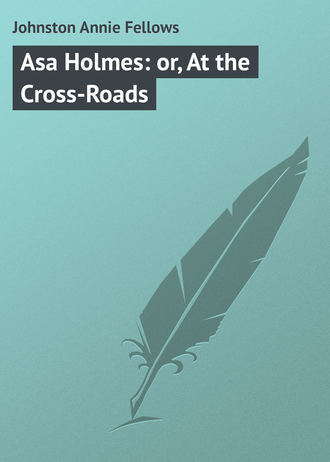 полная версия
полная версияAsa Holmes: or, At the Cross-Roads
There is an undefined note of pathos in a country funeral that is never reached in any other. The little schoolmistress felt it as she walked up the path to the old house behind the cedars. The front porch was full of men, who, dressed in their unaccustomed best, had the uneasy appearance of having come upon a Sunday in the middle of the week. Their heavy boots tiptoed clumsily through the hall, with a painful effort to go silently, as one by one the neighbours passed into the old sitting-room and out again. The room across the hall had been filled with rows of chairs, and the women who came first were sitting there in a deep silence, broken only by a cough now and then, a hoarse whisper or a rustle, as some one moved to make room for a newcomer.
It was a sombre assembly, for every one wore whatever black her wardrobe afforded, and many funeral occasions had left an accumulation of mourning millinery in every house in the neighbourhood. But the limp crape veils and black gloves and pall-like cashmere shawls were all congregated in the dimly lighted parlour. In the old sitting-room it was as cheerful and homelike as ever, save for the still form in the centre.
Through an open window the western sun streamed into the big, hospitable room, across the bright home-made rag carpet. The old clock in the corner ticked with the placid, steady stroke that had never failed or faltered, in any vicissitude of the generations for which it had marked the changes. No fire blazed on the old hearthstone that had warmed the hearts as well as the hands of the whole countryside on many a cheerful occasion. But a great bough of dogwood, laid across the shining andirons, filled the space with coral berries that glowed like live embers as the sun stole athwart them.
"Oh, if the old room could only speak!" thought Miss Anastasia, when her turn came to pass reverently in for a last look at the peaceful face. "There would be no need of man's eulogy."
But man's eulogy was added presently, when the old minister came in and took his place beside the coffin of his lifelong friend and neighbour. The men outside the porch closed in around the windows to listen. The women in the back rows of chairs in the adjoining room leaned forward eagerly. Those farthest away caught only a faltering sentence now and then.
"A hospitality as warm as his own hearthstone, as wide as his broad acres… No man can point to him and say he ever knowingly hurt or hindered a fellow creature… He never measured out to any man a scant bushel. Be it grain or good-will, it was ever an overflowing measure…" But those who could not hear all that was said could make the silent places eloquent with their own recollections, for he had taken a father's interest in them all, and manifested it by a score of kindly deeds, too kindly to ever be forgotten.
It was a perfect autumn day, sunny and golden and still, save for the patter of dropping nuts and the dry rustle of fallen leaves. A purple haze rested on the distant horizon like the bloom on a ripened grape. Down through the orchard, when the simple service was over, they carried their old friend to the family burying-ground, and, although voices had choked, and eyes overflowed before, there was neither sob nor tear, when the light of the sunset struck across the low mound, heaped with its covering of glowing autumn leaves. For if grief has no part in the sunset glory that ends the day, or in the perfect fulness of the autumn time, then it must indeed stand hushed, when a life comes both to its sunset and its harvest, in such royal fashion.
That evening at the Cross-Roads, Bowser lighted the first fire of the season in the rusty old stove, for the night was chilly. One by one the men accustomed to gather around it dropped in and took their usual places. The event of the day was all that was spoken of.
"Do you remember what he said last Thanksgiving, nearly a year ago?" asked Bowser. "It came back to me as I stood and looked at him to-day, and if I'd never believed in immortality before, I'd 'a' had to have believed in it then. The words seemed to fairly shine out of his face. He said 'The best comes after the harvest, when the wheat goes to make up blood and muscle and brain; when it's raised to a higher order of life in man. And it's the same with me. At eighty-five, when it looks as if I'd about reached the end, I've come to believe that "the best is yet to be."'"
There was a long pause, and Cy Akers said, slowly, "Somehow I can't feel that he is dead. Seems as if he'd just gone away a while. But Lord! how we're going to miss him here at the store."
"No, don't say that!" exclaimed Bud Hines, with more emotion than he had ever been known to show before. "Say, how we're going to feel him! I can't get him out of my mind. Every time I turn around, most, seems to me I can hear him laugh, and say, 'Don't cross your bridge till you come to it, Bud.' That saying of his rings in my ears every time I get in the dumps. Seems like he could set the calendar straight for us, all the year around. The winters wasn't so cold or the summers so hard to pull through, looking at life through his eyes."
Perkins's oldest crept up unnoticed. He added no word, but deep in his heart lay an impression that all the years to come could never erase; the remembrance of a kindly old man who had given him a new gospel, in that one phrase, "A brother to Santa Claus;" who had taught him to go out against his Philistines with simple directness of aim and whatever lay at hand; who had left behind him the philosophy of a cheerful optimist, and the example of a sweet simple life, unswerving in its loyalty to duty and to truth.
Over in the old homestead, Polly, standing in the firelight, fair and slender in her black gown, looked up at the tall young fellow beside her, and placed two little books in his hands. The old house was not her only heritage. The little atlas of the heavens was hers also. Standing there in the room where the beloved presence seemed to have left its benediction, Polly told the story of the love that had outlived Death. Then across the yellowed page of the old grammar where the faded violets lay, two hands met in the same sure clasp that had joined the souls of those older lovers, who somewhere beyond the stars were still repeating the old conjugation – "we love —for ever!"
THE END










